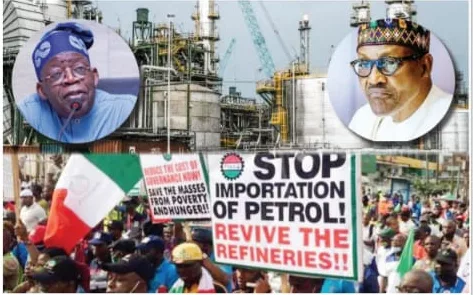The long-running tussle between the Nigerian masses and several regimes of the federal government has sparked wide controversy as to whether the federal government should continue to subsidise fuel or not.
On the one hand, fuel subsidies have tied up substantial percentages of Nigeria’s generated revenues to an industry that is fraught with corruption and inefficiencies. On the other hand, it is evident that the more than 50 per cent population of Nigeria that lives below the poverty line cannot cope with unsubsidised fuel as the upward movement of the price of fuel would inevitable affect the price of every other commodity and services.
The federal government’s plan to increase the wages by 40 per cent for civil servants would be a drop in the ocean for Nigeria’s labour force because Nigeria’s civil service constitutes merely 2.5 per cent of the country’s labour force. Many others, especially in the private sector, and SMEs would be impoverished.
However, according to the World Bank, subsidy payments could significantly impact public finance and pose debt sustainability concerns in Nigeria. Nigeria’s economy depends on petroleum, accounting for 90 per cent of its exports and about a tenth of its GDP. However, the petroleum industry recently recorded zero revenue.
The Nigerian National Petroleum Company released a report in October 2022 that revealed that the agency recorded zero revenue from oil export due to the subsidy payment. Petrol subsidy alone for October 2022 gulped N199 billion. Nigeria incurs too much cost to pay fuel subsidies. There is a need to consider removing the fuel subsidy to fund other sectors of the economy.
In Nigeria’s 2023 budget, the federal government (FG) allocated N3.6 trillion to pay for fuel subsidies for the first half of 2023. This figure shows a huge gap compared to the allocated N443 billion subsidy payment for January to June 2022. The federal government can utilise the enormous budget allocated to fuel subsidies to fund other strategic sectors.
One such strategic sector is building good roads to attract investors. Nigeria possesses abundant arable land areas that are uncultivated because they are not accessible. Research has shown that investment in good roads to enable transactions will bring about economic growth. A World Bank report also showed that better road infrastructure reduces transport costs, making it easier for businesses to reach internal and external markets.
Professor of petroleum engineering, David Egboga, said in order to boost the economy of the country, it is imperative that Nigeria considers attracting investors into the petroleum sector. The government has been issuing refinery licenses to private companies since 2000, but unfortunately, not even one refinery has been built. This has been due to the artificially- low price structure caused by fuel subsidies which have made it impossible for investors to recoup their investments.
“To create an environment that is conducive for investors, it is crucial to deregulate the oil sector. This move will enable the federal government to no longer remain the leading petroleum product supplier, allowing investors to take over the role of supplying petroleum products. This approach will provide investors with the necessary confidence to invest in the petroleum sector and create much-needed jobs for the people.
“In light of this, Nigeria should take a cue from Indonesia’s method when removing its fuel subsidy. Indonesia designed a cash-transfer program that targeted the poor and gained the trust of its citizens. Nigeria could reduce the percentage of excise taxes citizens pay, enabling them to afford the new fuel price,” he said.
A public affairs analyst, Dr. Inuwa Ibrahim, said, “Fuel subsidy removal in Nigeria is an economic necessity, as the subsidy funds could lead to major development gains. With the proper structure, such as building good infrastructure and a conducive environment for investors, removing subsidies can be the blessing the economy needs right now.”
However, Dr. Harry Osae, an economist, told NATIONAL ECONOMY that he’s in doubt the incoming government would have the effrontery to remove subsidies he stated that the with the current economic situation pervading the country, it would take an insensitive government to remove fuel subsidies and increase the price of fuel by 200 per cent.
He said that would result into a huge social unrest. Osae said the federal government should have first of all gotten the nation’s four refineries to work and licensed more modular refineries, while waiting for the Dangote Refinery.
“The mere fact that the federal government had made several promises to revive the the refineries and failed leaves Nigerians with little or no hope that it is serious about assuaging the pains that would emanate from subsidies removal,” he said.
Kayode Onofowakan, a fuel marketer in Lagos, concurred. He said the federal government should have empowered the private sector to produce fuel before embarking on subsidy removal he stressed the need to license more modular refineries to reduce the pressure on the country’s foreign exchange. He, however, cautioned that due to the economic environment, modular refineries have not been successful, even after licensing 20 of them more than a decade ago.





